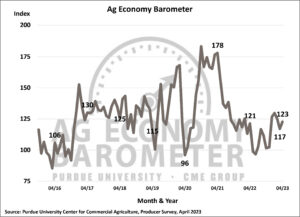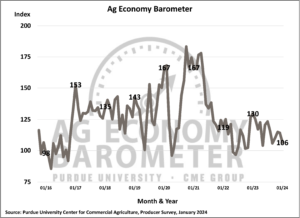Farmer sentiment improves; less pessimism over interest rates


WEST LAFAYETTE, Ind. and CHICAGO — Farmer sentiment improved modestly in April as the Purdue University/CME Group Ag Economy Barometer rose 6 points to a reading of 123. Both of the barometer’s sub-indices were also higher in April, the Current Conditions Index was up 3 points to 129 and the Future Expectations Index was up 7 points to 120. The Ag Economy Barometer is calculated each month from 400 U.S. agricultural producers’ responses to a telephone survey. This month’s survey was conducted between April 10-14.
“Producers held a more optimistic view of the agricultural economy in April,” said James Mintert, the barometer’s principal investigator and director of Purdue University’s Center for Commercial Agriculture. “A shift in farmers’ expectations regarding the Fed’s future interest rate policy could be a key reason.”
The Farm Financial Performance Index also improved this month, up 7 points to a reading of 93. The prime interest rate charged by U.S. commercial banks increased from 7.75% in January to 8% in late March, and since the February barometer survey, there has been a noticeable shift in farmers’ interest rate expectations. In April, 34% of respondents said they expect the U.S. prime interest rate to remain unchanged or decline over the next year, compared to 25% of producers who felt that way in February. At the same time, two-thirds (66%) of producers expect interest rates to keep rising, compared to 75% of respondents who felt that way in February. However, the biggest shift was a decline in the percentage of respondents who expect rates to rise between 1 to 2 percent in the next year, down 6 points since February to 37%.
The Farm Capital Investment Index increased one point to a reading of 43 in April; yet more than 70% of respondents continue to feel now is a bad time for large investments. This month, 39% of respondents cited “rising equipment and construction costs” while 33% cited “rising interest rates” as the top reason for now being a bad time for such investments.
Producers’ expectations for short-term farmland values increased in April following five-straight months of decline. The Short-Term Farmland Value Expectations Index rose 10 points in April to a reading of 123, while the long-term farmland index held steady at a reading of 142. Even with this month’s rise, the short-term index remains 21 points lower than a year earlier and 36 points lower than two years ago.
Farm bill discussions are heating up and this month’s survey included questions to learn more about producers’ perspectives on the legislation. When asked about the likelihood that a new farm bill will be passed this year, 12% of respondents think it’s very likely, 28% said somewhat likely, 16% said somewhat unlikely, and 13% said very unlikely. The survey also questioned corn and soybean producers on what they consider to be the most important aspect of a new farm bill. Of those respondents, 40% chose crop insurance, 31% chose commodity programs, 13% chose conservation, 8% chose agricultural research and extension, and 8% chose renewable energy as a top priority to them.
Leasing farmland for solar energy production continues to be a hot topic. In this month’s survey, 15% of respondents said that they had actively engaged in discussions with companies about leasing farmland for solar energy production in the past 6 months. Of those producers, nearly half indicated that lease rates of $1,000 or more per acre were discussed. Twenty-five percent of respondents said that, following the development and construction period, they were offered a lease rate of $1,250 or more per acre, while 22% of respondents said they were offered between $1,000 and $1,250 per acre. On the other end of the spectrum, 32% of respondents said they were offered lease rates of less than $500 per acre.
Read the full Ag Economy Barometer report at https://purdue.ag/agbarometer. The site also offers additional resources – such as past reports, charts and survey methodology – and a form to sign up for monthly barometer email updates and webinars.
Each month, the Purdue Center for Commercial Agriculture provides a short video analysis of the barometer results, available at https://purdue.ag/barometervideo. For more information, check out the Purdue Commercial AgCast podcast available at https://purdue.ag/agcast, which includes a detailed breakdown of each month’s barometer and a discussion of recent agricultural news that affects farmers.
The Ag Economy Barometer, Index of Current Conditions and Index of Future Expectations are available on the Bloomberg Terminal under the following ticker symbols: AGECBARO, AGECCURC and AGECFTEX.
About the Purdue University Center for Commercial Agriculture
The Center for Commercial Agriculture was founded in 2011 to provide professional development and educational programs for farmers. Housed within Purdue University’s Department of Agricultural Economics, the center’s faculty and staff develop and execute research and educational programs that address the different needs of managing in today’s business environment.
About CME Group
As the world’s leading derivatives marketplace, CME Group (www.cmegroup.com) enables clients to trade futures, options, cash and OTC markets, optimize portfolios, and analyze data – empowering market participants worldwide to efficiently manage risk and capture opportunities. CME Group exchanges offer the widest range of global benchmark products across all major asset classes based on interest rates, equity indexes, foreign exchange, energy, agricultural products and metals. The company offers futures and options on futures trading through the CME Globex® platform, fixed income trading via BrokerTec and foreign exchange trading on the EBS platform. In addition, it operates one of the world’s leading central counterparty clearing providers, CME Clearing.
CME Group, the Globe logo, CME, Chicago Mercantile Exchange, Globex, and, E-mini are trademarks of Chicago Mercantile Exchange Inc. CBOT and Chicago Board of Trade are trademarks of Board of Trade of the City of Chicago, Inc. NYMEX, New York Mercantile Exchange and ClearPort are trademarks of New York Mercantile Exchange, Inc. COMEX is a trademark of Commodity Exchange, Inc. BrokerTec and EBS are trademarks of BrokerTec Europe LTD and EBS Group LTD, respectively. The S&P 500 Index is a product of S&P Dow Jones Indices LLC (“S&P DJI”). “S&P®”, “S&P 500®”, “SPY®”, “SPX®”, US 500 and The 500 are trademarks of Standard & Poor’s Financial Services LLC; Dow Jones®, DJIA® and Dow Jones Industrial Average are service and/or trademarks of Dow Jones Trademark Holdings LLC. These trademarks have been licensed for use by Chicago Mercantile Exchange Inc. Futures contracts based on the S&P 500 Index are not sponsored, endorsed, marketed, or promoted by S&P DJI, and S&P DJI makes no representation regarding the advisability of investing in such products. All other trademarks are the property of their respective owners.
Writer: Kami Goodwin, 765-494-6999, [email protected]
Source: James Mintert, 765-494-7004, [email protected]
Media Contacts:
Aissa Good, Purdue University, 765-496-3884, [email protected]
Dana Schmidt, CME Group, 312-872-5443, [email protected]
Related websites:
Purdue University Center for Commercial Agriculture: http://purdue.edu/commercialag
CME Group: http://www.cmegroup.com/
Photo Caption: Farmer sentiment improves; less pessimism over interest rates (Purdue/CME Group Ag Economy Barometer/James Mintert).https://www.purdue.edu/uns/images/2023/april-barometerLO.jpg
The post Farmer sentiment improves; less pessimism over interest rates appeared first on Ag Economy Barometer.



